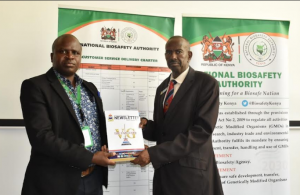The Defence College is a training facility for senior commanders in the Kenyan military and also from other African countries.

The college students were taken through the roles and mandate of the Authority in ensuring safe development, transfer, handling, and use of Genetically Modified Organisms (GMO) and their derived products.
Taking the military officers through their mandate, NBA Ag. Director, Biosafety, Research, and Compliance Josphat Muchiri said Kenya has in place a robust policy, legislative, and institutional mechanism for the implementation of biotechnology innovations.
Through the ratified Cartagena protocol on biosafety in 2003, an approved national policy on biotechnology development in 2006 and the enacted Biosafety Act in 2009 served to establish the National Biosafety Authority (NBA) in 2010.
Since its inception, Muchiri explained that NBA has developed and continues to implement four biosafety regulations, namely research on genetic modification done under appropriate experimental conditions, open cultivation of genetically modified crops that are safe for human health and the environment, safe movement of genetically modified materials in and out of the country, and accurate consumer information and traceability of genetically modified productions in the food supply value chain.
The Ag. Director noted that food security is a national security issue because it is a primary responsibility of the government to protect its citizens from all threats, including food insecurity.
“The NBA role in facilitating approvals of safe biotech crops and animal breeds that are resistant to pests and diseases and lead to increased food production cannot therefore be emphasised,” he said.
On decisions of GMO applications, so far the Authority has approved 45 GMO applications under the lab experiment, 18 under confined field trials, and 28 on import and transit, with three environmental releases placed on the market.
The three environmental releases are BT cotton, which was commercialised in 2020 with around 10,000 acres planted in the Eastern, Central, Western, and Nyanza Regions.
The Bt maize was approved by the NBA in October 2022 and awaits variety release by the National Veterinary Research Centre (NVRC), while GM cassava is undergoing variety testing by the Kenya Plant Health Inspectorate Services (KEPHIS).
Despite the approval of the BT maize in October 2022, and just a month ago, following the dismissal of petitions that were challenging the lifting of the ban on Genetically Modified Foods in Kenya and their derived products, Muchiri acknowledged that there has been low public awareness on GMOs and biosafety.
The Authority is tasked with the role of creating public awareness to educate Kenyans on GMO foods, including regulatory safeguards and the importance of informed consumer choice.
In the future, Muchiri said the NBA will be looking at the expansion of the Authority’s mandate by reviewing the Biosafety Act to cover emerging technologies related to GMOs such as genome editing, gene-drive technologies, synthetic biology, biosecurity, and pharmaceuticals, among others.
They will also be looking towards the construction of NBA HQs, serving as the Centre of Excellence on Biosafety and Regional Molecular Reference Laboratory at the Kabete Vet Labs, and further overseeing decentralisation to more ports of entry, regional offices, and increased staff establishment.
“Structured partnerships with regional and global bodies on biosafety matters as well as partnerships with county governments on biosafety awareness programs are also in the offing,” Muchiri said.
The NDC team, led by Major-General Y. S. Abdi and Brig. Richard M. Mwanzia, lauded the critical role that NBA institutions play in food security.
Abdi called on the agency to work with all the relevant government agencies to ensure that the GMO products that come into the country are safe for human consumption.
“We want to assure NBA of more engagement, and NDC is keen to foster more good working relations with other government agencies such as NBA,” he said.
The mandate of the National Biosafety Authority is supervision and control over the transfer, handling, and use of GMOs with a view to ensuring the safety of human and animal health and the provision of an adequate level of protection of the environment.
The Authority’s role fits well with the current government agenda, the Bottom-Up Economic Transformation Agenda (BETA), focusing on agricultural transformation and inclusive growth.
By Wangari Ndirangu


